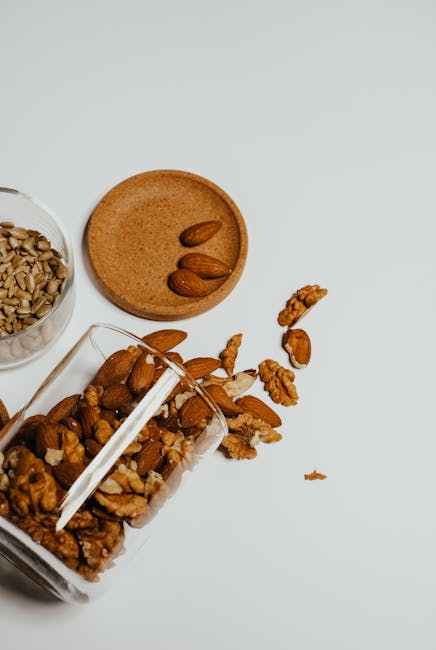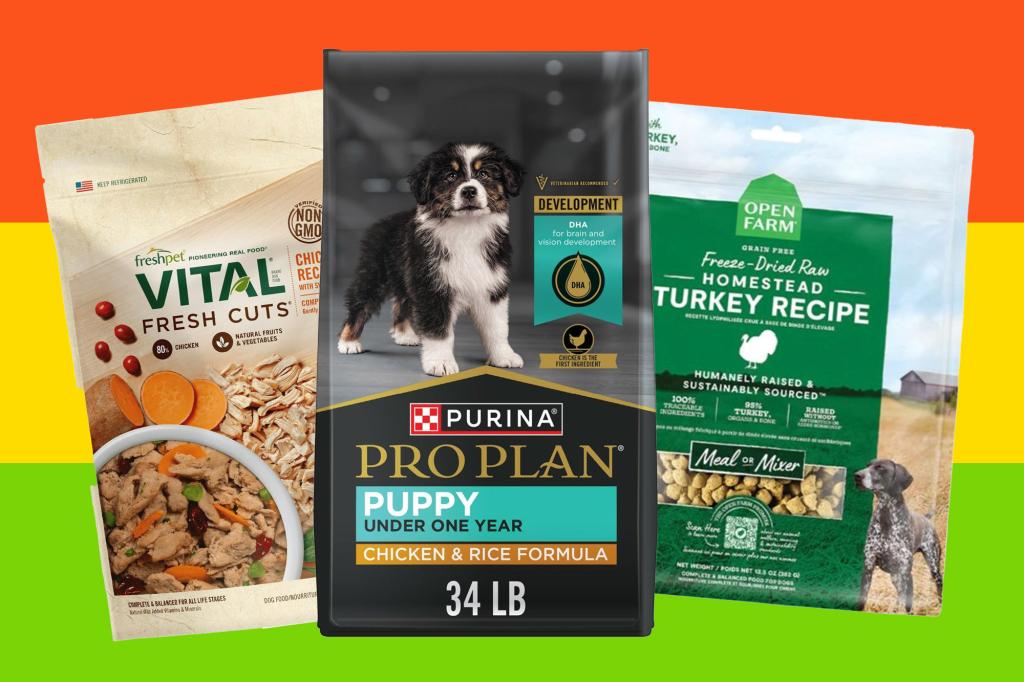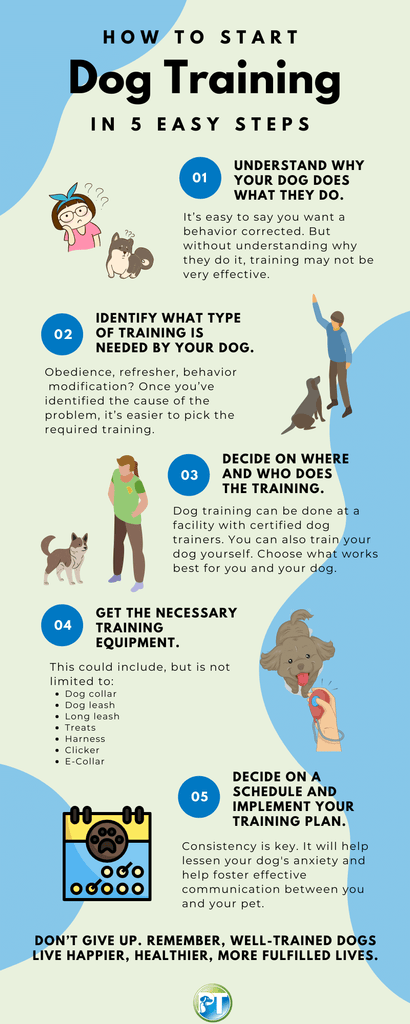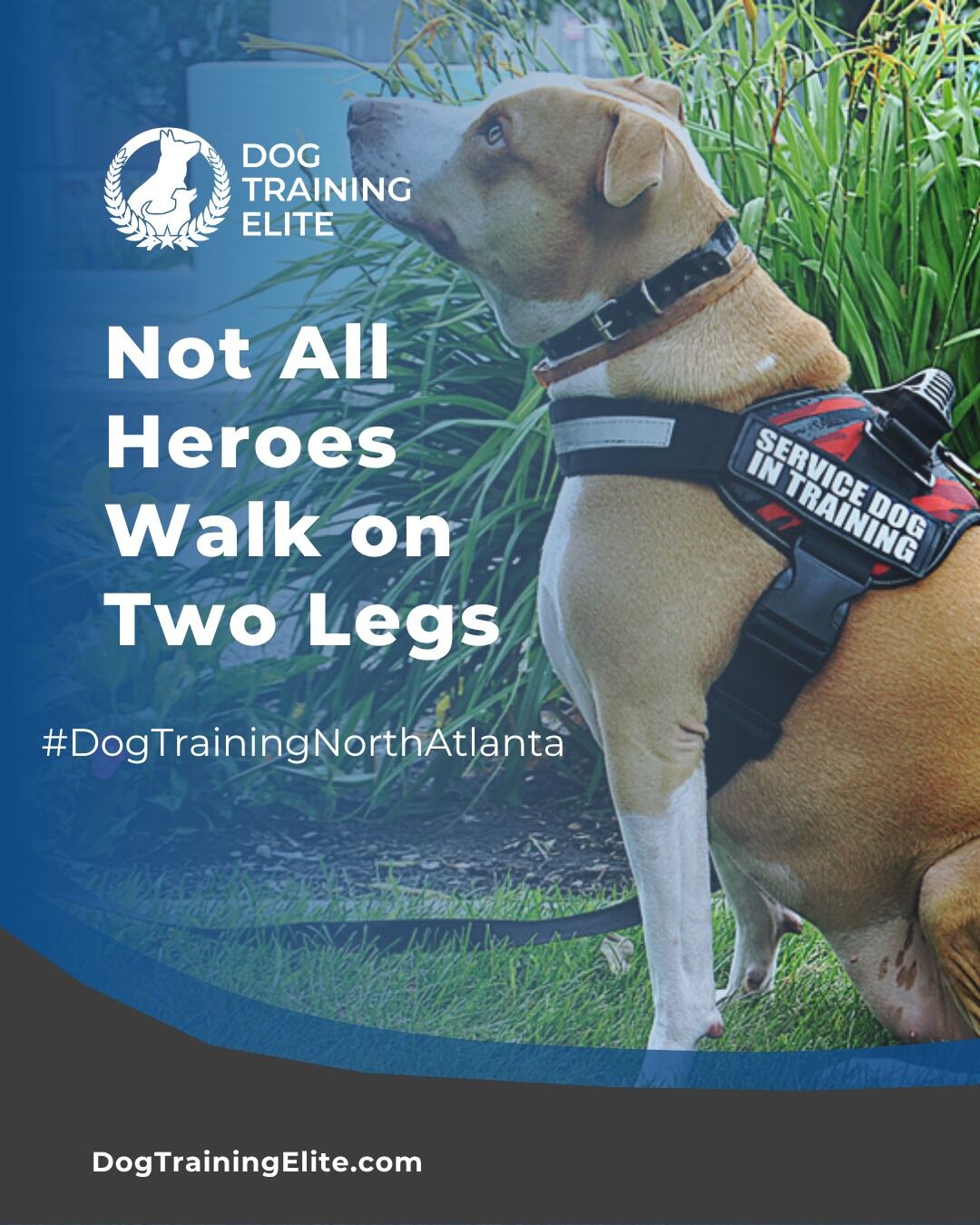Are you sure your dog is getting the right nutrients every day? What you feed your furry friend affects their energy, mood, and overall health more than you might think.
Understanding your dog’s nutritional needs isn’t just about picking any dog food off the shelf—it’s about knowing what keeps them strong, happy, and full of life. Keep reading to discover exactly what your dog needs to thrive and how you can make smart choices that will give them the best care possible.
Essential Nutrients For Dogs
Dogs need a balanced diet to stay healthy and active. Essential nutrients support their growth, energy, and body functions. Each nutrient plays a unique role in maintaining their well-being. Understanding these nutrients helps provide the best care for your dog.
Proteins
Proteins build and repair body tissues. They are vital for muscle development and immune health. Dogs require high-quality protein from meat, fish, or eggs. Protein also helps produce enzymes and hormones.
Fats
Fats provide energy and support cell growth. They help absorb vitamins and keep the skin healthy. Essential fatty acids like omega-3 and omega-6 must come from food. Fats also cushion organs and regulate body temperature.
Carbohydrates
Carbohydrates supply quick energy for daily activities. They come from grains, vegetables, and fruits. Fiber, a type of carbohydrate, aids digestion and keeps stools regular. Moderate carbs balance energy without causing weight gain.
Vitamins And Minerals
Vitamins and minerals support many body functions. Vitamins A, D, E, and K help with vision, bones, and skin. Minerals like calcium and phosphorus strengthen teeth and bones. They also help nerves and muscles work properly.
Water
Water is vital for life and overall health. It regulates body temperature and aids digestion. Fresh water prevents dehydration and supports organ function. Dogs need constant access to clean water every day.
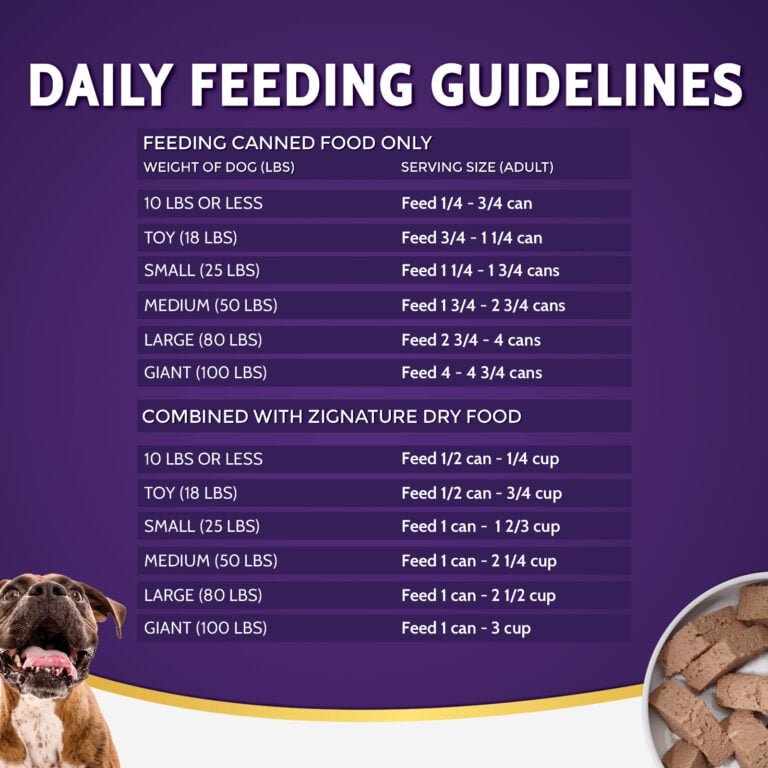
Credit: zignature.com
Age-based Nutritional Needs
Your dog’s nutritional needs change as they grow and age. Each stage of life demands different nutrients to support health, energy, and overall well-being. Understanding these age-based nutritional needs helps you provide the right food at the right time.
Puppies
Puppies need food rich in protein and fat to support rapid growth and high energy levels. Their diet should include essential vitamins and minerals to build strong bones and a healthy immune system. Feeding a high-quality puppy formula helps meet these needs without overloading their tiny digestive systems.
Have you noticed how your puppy’s appetite seems endless? That’s because they burn a lot of energy exploring and learning. Providing balanced meals throughout the day keeps them fueled and happy.
Adult Dogs
Adult dogs require a balanced diet that maintains their weight and supports steady energy. Protein remains important, but the focus shifts to maintaining muscle tone and preventing obesity. Including fiber and antioxidants in their meals helps digestion and boosts immune health.
Think about your dog’s activity level. An active dog will need more calories than a couch potato. Adjusting portions and nutrient content based on lifestyle prevents unwanted weight gain.
Senior Dogs
Senior dogs benefit from diets lower in calories but rich in nutrients that support joint health and cognitive function. Adding omega-3 fatty acids and antioxidants can help reduce inflammation and keep their minds sharp. It’s also important to monitor protein intake carefully to preserve muscle mass without overloading their kidneys.
Have you seen your older dog slow down or stiffen up? Their diet plays a key role in managing these changes. Tailoring meals to their aging body can improve quality of life and keep them comfortable.
Special Dietary Considerations
Every dog has unique nutritional needs that go beyond just filling their bowl. Special dietary considerations can make a big difference in your dog’s health and happiness. Paying attention to these factors ensures your furry friend gets exactly what they need to thrive.
Breed-specific Needs
Different breeds have different energy levels and nutritional requirements. For example, large breeds like Great Danes benefit from controlled calcium and phosphorus levels to support bone growth. Smaller breeds, such as Chihuahuas, often need calorie-dense food because they burn energy faster.
Have you noticed how your dog’s breed influences their appetite or activity? Tailoring their diet to breed-specific traits helps avoid common issues and supports their natural lifestyle.
Health Conditions
Health issues like allergies, kidney problems, or diabetes change what your dog should eat. Dogs with allergies might need limited ingredient diets free from common allergens like beef or wheat. Kidney disease requires low-protein meals to reduce strain on the organs.
Always consult your vet before changing your dog’s diet due to health concerns. Have you observed any symptoms that could be linked to diet? Keeping a food diary can help identify triggers and improve your dog’s wellbeing.
Weight Management
Maintaining a healthy weight is crucial for preventing diseases and extending your dog’s life. Overweight dogs may need fewer calories and more fiber, while underweight dogs require nutrient-rich food to gain healthy weight. Portion control and regular exercise go hand in hand.
Do you measure your dog’s food or feed by eye? Using a scale or measuring cups ensures you’re not overfeeding or underfeeding. Small changes in diet can lead to big improvements in your dog’s energy and health.
Selecting Quality Dog Food
Choosing the right food for your dog plays a huge role in their health and happiness. Quality dog food supports energy levels, strengthens immunity, and promotes a shiny coat. But how do you decide what’s truly good for your furry friend in a market full of options?
Reading Labels
Labels tell you exactly what your dog is eating. Look for clear information about protein sources, fat content, and added vitamins. Avoid foods with vague terms like “meat by-products” or too many preservatives.
Check the guaranteed analysis section for protein and fat percentages. Dogs need a balance that matches their age, size, and activity level. Have you ever noticed how some dog foods list “chicken” as the first ingredient, while others say “chicken flavor”? That difference matters.
Choosing Between Wet And Dry Food
Deciding between wet and dry food depends on your dog’s preferences and health needs. Dry food usually helps keep teeth cleaner and is easier to store. Wet food, with higher moisture content, can be better for dogs who don’t drink enough water or have dental issues.
Some dogs thrive on a mix of both. You might find your dog enjoys the texture variety, and you can adjust portions based on activity and weight. What has worked best for your dog’s energy and digestion?
Understanding Ingredients
Ingredients reveal the quality of the dog food beyond just protein and fat numbers. Whole meats, vegetables, and grains are good signs. Ingredients like corn or wheat might be fillers and less nutritious.
Be cautious of additives and artificial colors that don’t add nutritional value. If you ever had to switch your dog’s food due to allergies, you know how crucial ingredient awareness becomes. Would you choose food with a simple ingredient list over a complex one?
Homemade Vs. Commercial Diets
Deciding between homemade and commercial diets for your dog involves weighing both convenience and control over ingredients. Each option offers unique advantages and challenges that directly affect your dog’s health. Understanding these can help you make informed choices that suit your dog’s specific nutritional needs.
Benefits And Drawbacks Of Homemade Diets
Homemade diets let you choose every ingredient, ensuring your dog eats fresh, whole foods. You can avoid preservatives, fillers, and allergens common in many commercial products.
However, crafting a balanced homemade meal takes effort and knowledge. Without proper guidance, you risk nutritional gaps or excesses that can harm your dog over time.
Have you ever tried preparing meals for your dog only to worry if they’re truly balanced? That’s a common concern among pet owners switching to homemade food.
Evaluating Commercial Options
Commercial diets are designed for convenience and often meet established nutritional standards. Many brands undergo rigorous testing to ensure complete and balanced nutrition.
Still, not all commercial foods are created equal. Ingredients can vary widely, and some products include fillers or additives that don’t benefit your dog.
Look beyond marketing claims—check labels for real meat sources, avoid artificial colors, and prefer brands with transparent ingredient lists. How confident are you in the quality of your dog’s current food?
Supplementing Homemade Meals
To fill nutrition gaps in homemade meals, supplements are often necessary. Adding omega-3 fatty acids, vitamins, or minerals can prevent deficiencies.
Consult your vet or a pet nutritionist before adding supplements. An imbalance can cause more harm than good.
Try tracking your dog’s energy levels and coat quality after starting supplements—these can be good indicators of improved nutrition. What small changes could you make today to boost your dog’s diet?
Common Nutritional Myths
Many dog owners get caught up in popular nutritional myths that can actually harm their pets. These myths often come from well-meaning advice or trendy diets but don’t always match what science says about a dog’s needs. Understanding the truth behind these myths helps you make smarter choices for your dog’s health and happiness.
Grain-free Diets
Grain-free dog food has become very popular, but it’s not always necessary or healthier for your dog. Some owners believe grains cause allergies or digestive issues, but true grain allergies are quite rare in dogs.
In fact, removing grains without proper substitutes can lead to nutrient imbalances. The FDA has even investigated a possible link between grain-free diets and heart disease in dogs. Before switching your dog to grain-free food, ask yourself: Is this diet really solving a problem, or just a trend?
Raw Food Diets
Raw food diets promise a natural way to feed your dog, often including raw meat, bones, and organs. While it sounds appealing, raw diets can carry risks like bacterial contamination and nutritional gaps.
I tried feeding my dog a raw diet for a month and noticed she became less energetic. It turned out her diet lacked certain vitamins that are easier to balance in commercial foods. Always consult a vet before making raw food the main part of your dog’s diet.
Human Food For Dogs
Feeding your dog leftovers or snacks from your plate might seem harmless, but many human foods are toxic or unhealthy for dogs. Ingredients like onions, garlic, chocolate, and certain spices can cause serious health problems.
Even healthy foods like avocado or grapes can be dangerous. Instead of guessing, stick to dog-safe treats and check with your vet if you want to add fresh foods to your dog’s meals.
Monitoring Your Dog’s Health
Keeping a close eye on your dog’s health is key to ensuring they get the right nutrition. Monitoring helps you catch problems early before they turn serious. It also allows you to fine-tune their diet to match their changing needs.
Signs Of Nutritional Deficiencies
Watch for changes in your dog’s coat, like dullness or excessive shedding. Sudden weight loss or gain can also signal a problem with their diet. Lethargy, poor appetite, or digestive issues like diarrhea might mean they’re missing essential nutrients.
Have you noticed your dog scratching more than usual or developing sores? These can be signs of vitamin or mineral deficiencies. Acting quickly can prevent long-term health issues.
Regular Vet Check-ups
Scheduling regular vet visits is crucial. Your vet can run blood tests to spot any hidden nutritional gaps. They also assess your dog’s overall health and recommend dietary adjustments.
Don’t wait for obvious symptoms to appear. Routine check-ups help you stay ahead of problems and keep your dog feeling their best.
Adjusting Diets Based On Activity Level
Your dog’s energy needs change with their activity. A highly active dog requires more calories and protein to stay strong. On the other hand, a less active or older dog may need fewer calories to avoid weight gain.
Try tracking your dog’s daily activity and observe how their weight responds to diet changes. Could small tweaks improve their energy and vitality?

Credit: pupford.com
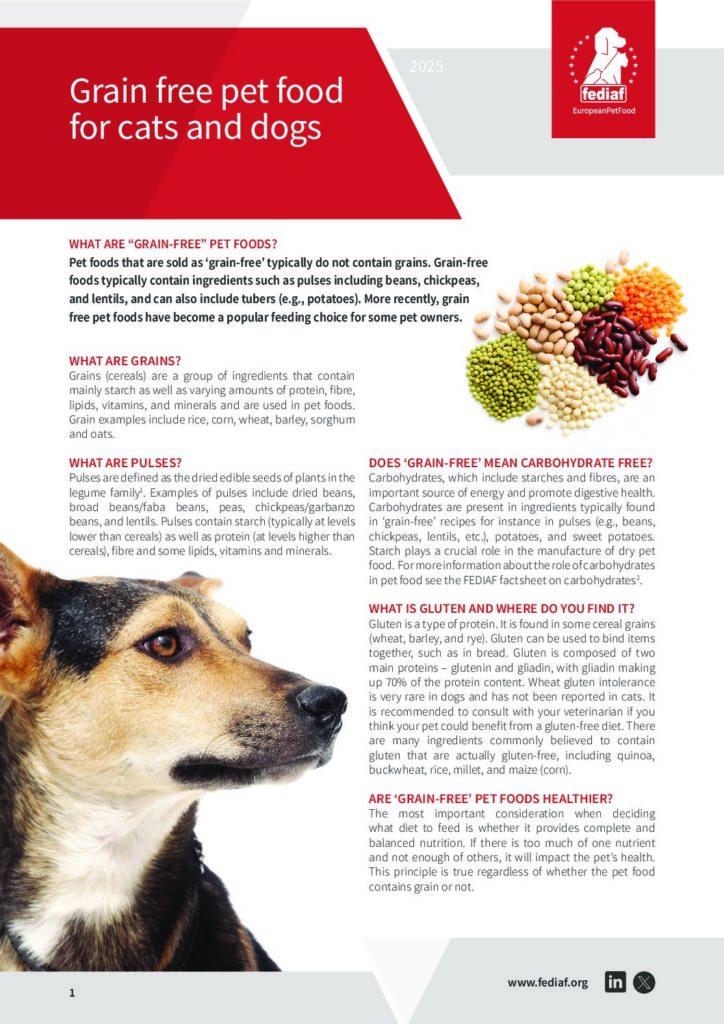
Credit: europeanpetfood.org
Frequently Asked Questions
What Are The Essential Nutrients For A Dog’s Diet?
Dogs need proteins, fats, carbohydrates, vitamins, and minerals. Proteins support muscle growth. Fats provide energy. Carbs offer fiber and fuel. Vitamins and minerals ensure overall health and immunity.
How Much Protein Should Dogs Consume Daily?
Dogs require 18-25% protein daily, depending on age and activity. Puppies and active dogs need higher amounts to build muscles and maintain energy levels.
Can Dogs Eat Human Food For Nutrition?
Some human foods like cooked chicken and vegetables are safe. Avoid toxic foods such as chocolate, onions, and grapes. Always consult a vet before offering human food.
Why Is Balanced Nutrition Important For Dogs?
Balanced nutrition supports growth, immune function, and energy. It prevents obesity and diseases. Proper diets ensure dogs live longer, healthier lives with better vitality.
Conclusion
A dog’s nutrition affects its health and happiness daily. Balanced food keeps energy high and supports growth. Proteins, fats, vitamins, and minerals all play key roles. Fresh water is vital for digestion and life. Feeding the right portions helps avoid weight problems.
Regular vet visits ensure your dog stays strong. Understanding your dog’s needs leads to better care. Healthy dogs live longer and enjoy more playtime. Simple, good nutrition makes a big difference every day. Caring for your dog starts with what’s on the plate.

